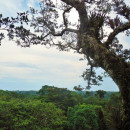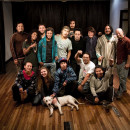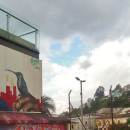Shifting Paradigms - Equal Exchange, Mutual Learning, Growing Together Past Review
By Ellie R (Peace Studies, Conflict Resolution, Juniata College) - abroad from 01/09/2015 to 05/09/2015 with
Pachaysana Institute: Ecuador - Rehearsing Change
Choosing this program was probably one of the most valuable things I've ever done. This semester showed me that fair exchange is actually accomplishable. I learned so much about human ability, including my own, and the meaningfulness (and closeness of meaning) of story, memory, and identity. It made me remember how incredibly beautiful this planet and its inhabitants are and why whatever it actually is that I'm pursuing is worth it.
Review Photos



Personal Information
| How much international exposure did you have prior to this program? | 1 month - 6 months |
Review Your Program
|
* Overall educational experience
Academic rigor, intensity, resources, etc. |
With profound readings and intensive class discussions, this program made me delve into myself and my conceptions of humanity. Assignments push you to create, deeply consider the way you think, and grow. |
|
* Host Country Program Administration
On-site administration of your program |
The administrators of Rehearsing Change are right there along with the students, living the intense experience with them. This makes them extremely responsive and sensitive, as well as prepared and knowledgeable. |
|
* Housing:
How satisfied were you with your living arrangements? |
I lived with two beautiful host families, one in a very safe neighborhood in the historic center of Quito and another in the community of Mariscal Sucre. When I stepped into their houses, I was coming home. |
| * Food: |
Fresh fruit is abundant and empanadas are delicious. Ecuador is wonderful for eaters both adventurous and cautious, and there are countless restaurants and street food vendors to be found in Quito. |
|
* Social & Cultural Integration:
How integrated did you feel with the local culture? |
Engaging and being present are at the heart of this program. Because all classes are held with local counterparts and students live with host families, it is impossible to only be a visitor. |
|
* Health Care:
How well were health issues addressed during the program? |
A Yellow Fever vaccination is required for this program. It is generally far cheaper and easier to receive it after arrival in Ecuador. |
| * Safety: |
Mariscal Sucre is exceedingly safe. Quito, however, is less so. Theft is not uncommon and I was mugged once. Students are given a thorough safety orientation at the beginning of the semester and staff are immensely sensitive and helpful should an incident occur. Following the advice given in the safety orientation and using common sense should keep you safe. |
| If you could do it all over again would you choose the same program? |
Yes
|
Finances
|
* Money: How easily were you able to live on a student's budget?
(1 = not very easy/$200+ on food & personal expenses/week, 2.5 = $100/week, 5 = very easily/minimal cost) |
Transportation and food need not be expensive. You can buy full meals for $2-$4 and bus fare around Quito is pennies. |
| Do you have any general money-saving tips for future study abroad participants? | If you do your own traveling, don't get sucked into the more expensive touristy places. You can find plenty of nice hostels for much less than more popular hotels. The same goes for restaurants, etc. |
Language
| * Did your program have a foreign language component? | Yes |
|
How much did the program encourage you to use the language?
0 = No encouragement, 5 = frequent encouragement to use the language |
Classes are all in Spanish, readings are often in Spanish, and host families often do not speak much English, if any. |
| How would you rate your language skills at the beginning of the program? | Intermediate |
| How would you rate your language skills at the end of the program? | Advanced |
| What was the highest level language course you had completed prior to departure? | 300 |
| How many hours per day did you use the language? | |
| Do you have any tips/advice on the best ways to practice the language for future study abroad participants? | Make yourself speak, even if you know it's not perfect. Actually speaking will break down any insecurities you may have as well as make you learn. Practice with others and, when that's not an option, read Spanish texts out loud. Get used to your voice speaking the language. |
Other Program Information
|
* Where did you live?
Select all that apply |
|
|
* Who did you live with?
Select all that apply |
|
|
* Who did you take classes with?
Select all that apply |
|
| About how many local friends did you make that you will likely keep in touch with? | 10+ |
A Look Back
| * What did you like most about the program? |
|
| * What could be improved? |
|
| * What do you know now that you wish you knew before going on this program? | I wish I could have known just how impactful this program would be for me - perhaps I could have been more receptive from the outset if I'd realized how radical a shift this program is from the education to which I'd grown accustomed. I also wish I'd known the Spanish I wanted to be able to engage to the fullest. |
Individual Course Reviews
| Course Name/Rating: |
Design & Evaluation of Sustainable Community Projects |
| Course Department: | |
| Instructor: | Will Waters |
| Instruction Language: | Spanish |
| Comments: | This was the course for which I have been waiting my entire life. This was an intensive course, one in which we not only studied the theory behind community development but actually put it into practice, designing projects and beginning some. It was taught within the community itself, and sitting the course with us were local counterparts with whom we worked intimately. It was difficult, mostly because it was real and I was therefore so much more invested. It showed me that community development doesn't have to be outside-in or top-down. |
| Credit Transfer Issues: |








